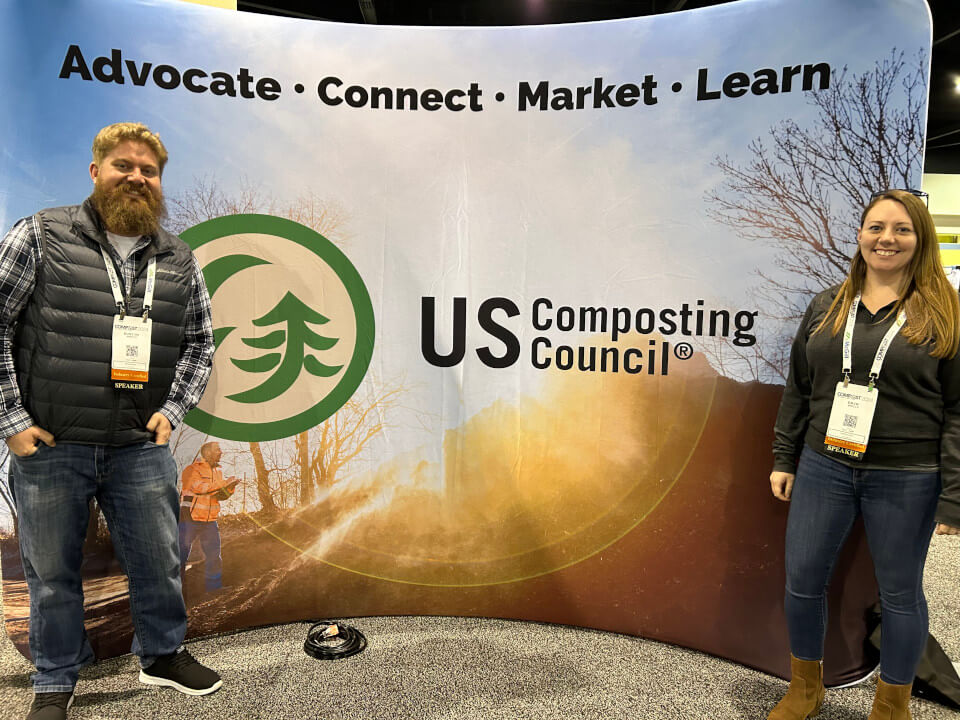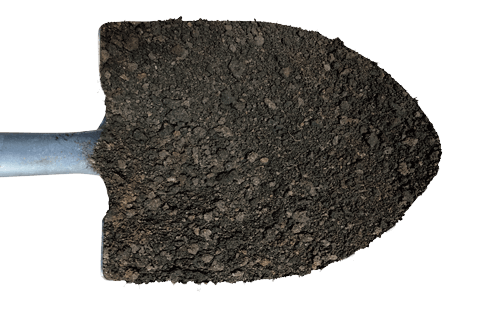SMSC Organics Recycling Facility Names New Leadership
Spending more than two minutes with Dustin Montey and Erin Skelly results in gaining two new friends for life. The leadership team for the SMSC Organics Recycling Facility and the forthcoming Dakota Prairie Composting is as focused on relationships as they are on soil. Montey, the new Director of both locations, and Skelly, the Compost Operations Manager, put people first, and it shows in everything they do.
As they interact with hundreds of customers at a trade show, they carry on multiple conversations at once and refer inquiries to each other’s expertise. “We’ve worked as a team since I started,” said Skelly, who began her work as an Environmental Technician in 2017. “Al [Friedges; former manager] always had us go to trade shows and classes and conferences together, because we have different specialties.”
Montey and Skelly finish each other’s sentences as they discuss the plan for the day or explain the technical details of the ongoing construction at the new composting site opening this fall. They support each other’s ideas and easily joke around about anything.
“We’re lucky,” said Skelly, “we get along really well, even when he’s irritating me,” and they both laugh.
Luck is the one thing Skelly didn’t need as she built her career and reputation in the environmental sciences field. Her hard work and willingness to try anything has led to her leadership at just 32 years old.
Skelly graduated from Winona State University in 2014 with a B.S. in Environmental Science. She worked for the Three Rivers Park District in the forestry and gardening divisions every summer during college, growing and planting the trees and shrubs for the multi-county park system. After college, she took an internship at the Wyoming Bureau of Land Management doing conservation land management and tracking wild horses.
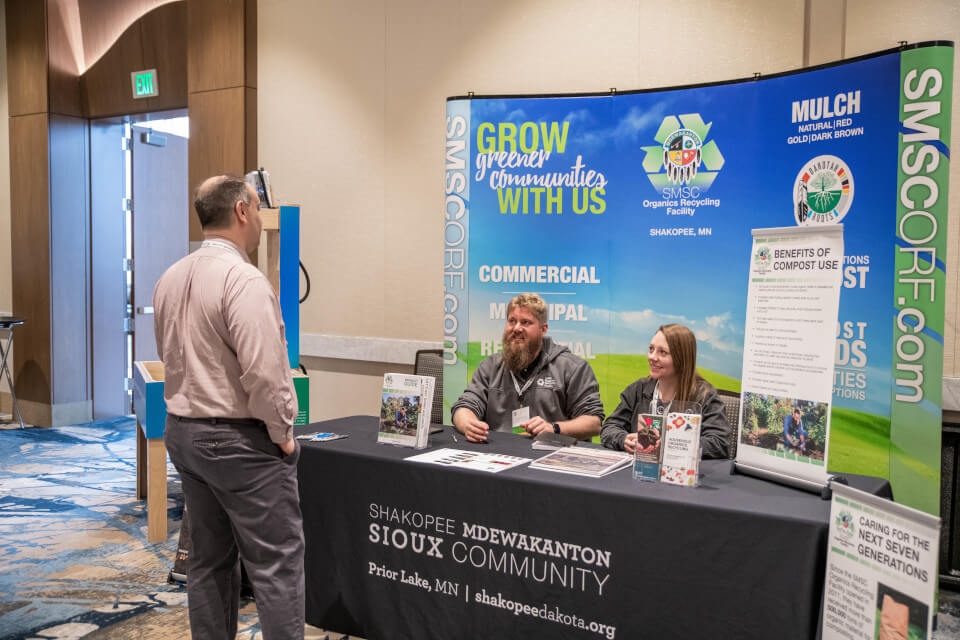
“Some days my only job was to find and follow the horses. We would get in the truck and drive around two million acres of land until we found the herds. We would count them, monitor their health, and observe their behaviors. It was so cool.”
She loved the beauty of Wyoming, but ultimately wanted to return to her home state of Minnesota. She was working for the postal service when she found a listing on a job site for the SMSC.
“I had no idea what I’d be doing when I interviewed. Environmental Technician could mean anything, and the job description didn’t mention compost at all,” Skelly remembers. “It’s been amazing the way my job has changed and grown over the years. I’ve never been bored at work. Not one single day.”
Skelly’s role has seen both unplanned changes, like when the construction of the Cultural Center unearthed a large vein of stone that had to be removed, so she became a MnDOT Certified Construction Technician in Aggregate Production so they could sell the stone and gravel, and planned changes, as she trained to take over compliance and safety, earning both her OSHA 30 General Industry certification and a Certified Compost Operations Management (CCOM) certification.
Skelly talks passionately about soil health, compost benefits, and the new aerated static pile (ASP) method of composting they’ll be using in the new location. She shares her expertise with anyone who asks as she smiles and waves at convention attendees or people who join her for tours of the facility.
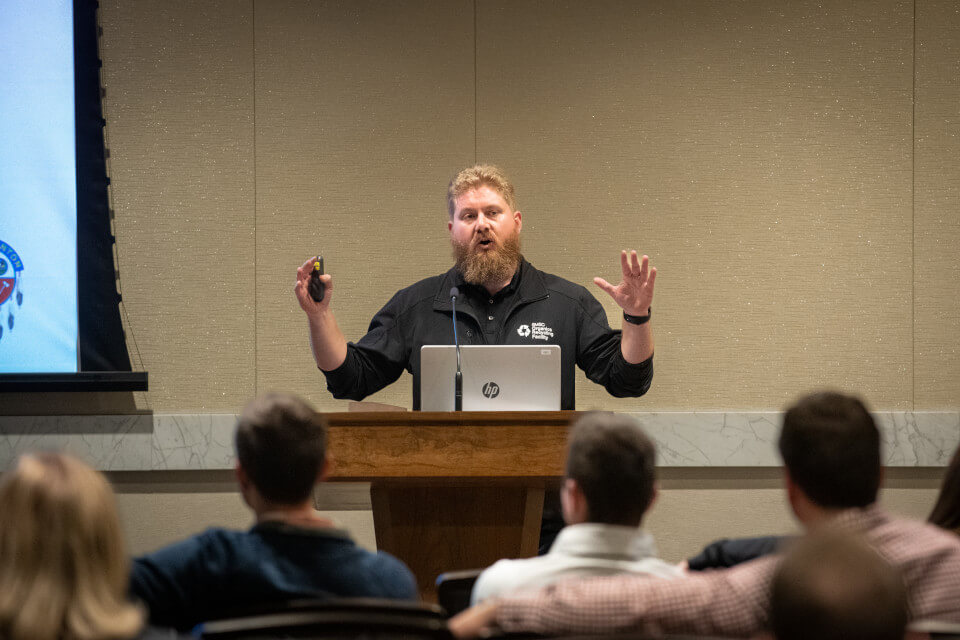
When asked about how she likes being a woman in a very male-dominated field, Skelly laughs. “It’s not always easy, but I just roll with it. I’ve had people ask me if there was a man they can talk to instead of me. It’s annoying, but all I can do is prove myself as an expert. You have to make a name for yourself in this industry, and I think I have. It’s a niche line of work, so people know me now.”
Make a name she has, as Skelly presents on safety, soil health, composting procedures and more in both small settings like calls to other tribes who wish to duplicate the work the SMSC is doing, and large settings like speaking at the US Composting Council annual conference.
Skelly’s focus on the science and safety side of the operation allows Montey to focus on the sales and equipment.
Montey embodies leadership by example as he seamlessly shifts from menial tasks like opening hundreds of packages of marketing materials to high level executive tasks such as signing multibillion dollar companies to long-term contracts. This style of management comes as no surprise, as Montey has been learning on the job since the day he was hired as an Equipment Operator in 2014.
“They asked me what kind of machinery I was trained in, and I said none,” Montey quipped, “but I had just finished almost five years in the Marines, so I figured it wouldn’t be that hard to figure out.”
Montey had in fact operated a front loader before, during a tour of duty in which the Heavy Equipment Operator on his team was injured, and no one else could do the job. “No one wanted to put themselves in that position, but I thought it couldn’t be more dangerous than what I normally did as a Combat Engineer.” He hopped in the front loader and taught himself how to operate it while risking active fire.
Taking on new challenges and finding innovative solutions is the story of Montey’s life. Serving out of Camp Pendleton in California, he was paying over $4,500 a month in rent in Orange County. “I figured out I could buy a boat and rent a slip for far less than my rent. So, I decided to live on a sailboat.”
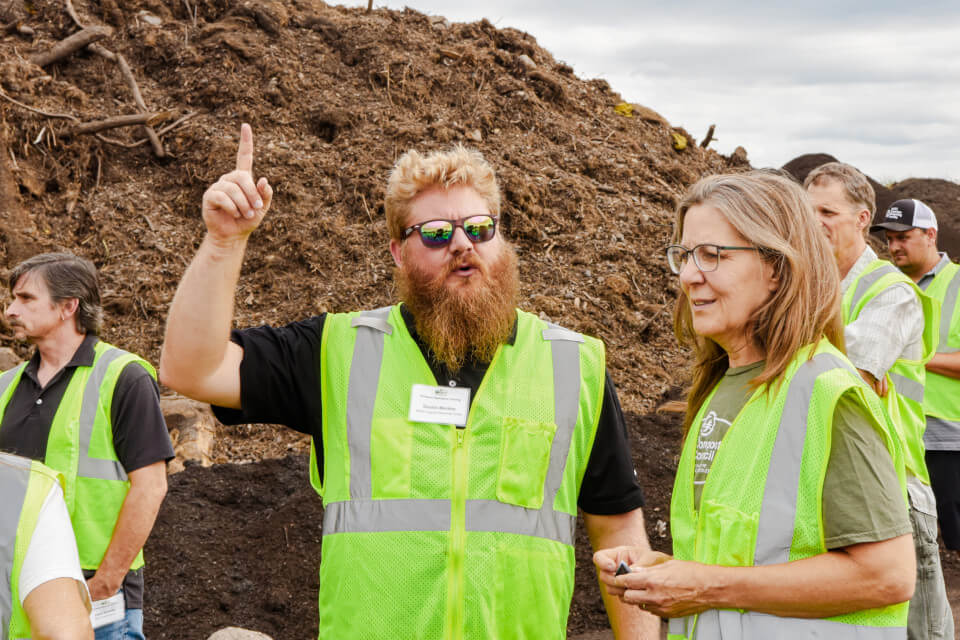
Sounds reasonable, but Montey had never sailed before. “I bought a sailboat from a lady in Newport Beach, and I drove up there, bought the boat, and then asked her how to put the sails up. She was like, ‘Wait, you’ve never sailed before? Where are you going?’ I told her I would figure it out, but she said she didn’t have any plans for a few hours and sailed it back with me. She taught me how to sail. It was epic.”
The challenges and learning haven’t stopped in Montey’s 10 years with the SMSC. Montey has been promoted every two to three years in his time with the SMSC from Equipment Operator to Lead Biomass Processing Technician to Assistant Manager and now Director. Like Skelly, he’s reached a high level of leadership at young age and made quite a name for himself. Montey has been elected twice to the Minnesota Composting Council’s Board of Directors, has earned his Certified Compost Operations Manager (CCOM) certification, and was nationally recognized with the Waste360’s “40 Under 40” Award for professionals in the waste industry.
Age is just a number, though, as this leadership team has grown the current facility to capacity, requiring a new facility triple the size of the current. Once complete, Dakota Prairie will be the largest composting facility in the Midwest, with the capacity to compost 212,500 tons of organic material annually.
The long process of developing and implementing a new location has been their biggest challenge so far, but they’ve built up to it. Montey noted the differences they’ve seen in his past 10 years.
“It’s a completely different operation, holistically from every single point, it’s different for the better. I think to continue to increase our revenue, we have to prepare for a weird year or two with trying to transition out of a site and start a new one, which will have its own kind of set of challenges. But after the transition is completely done, I think the revenue is just going to keep growing.”
Skelly agreed completely, noting, “Five years ago, we used winter as a time to get caught up. I filed everything from the year, got caught up on emails. The phone didn’t ring. Now, it rings nonstop all year long.”
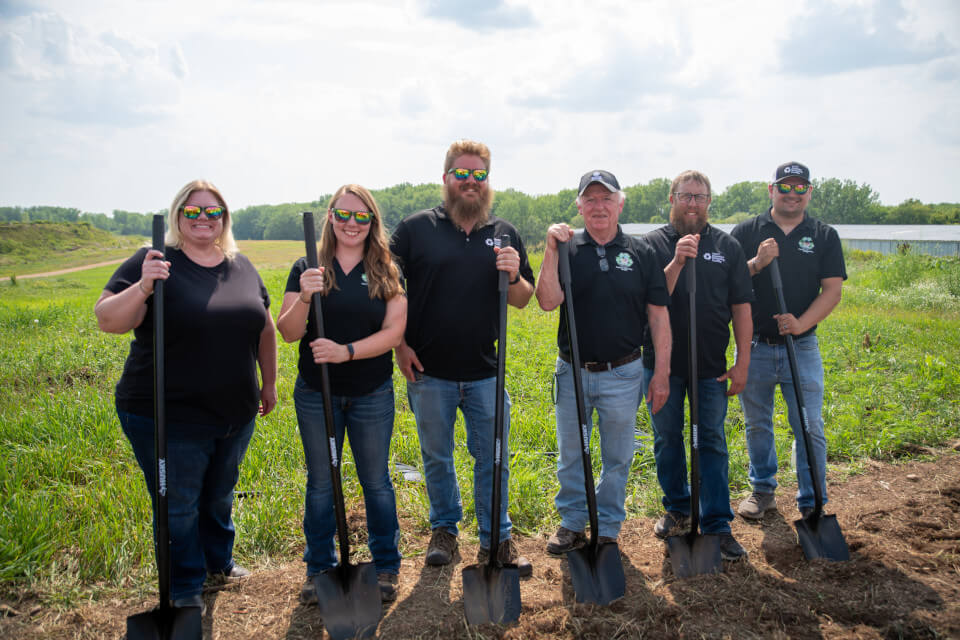
To handle the current growth and the upcoming opening, they are in the process of hiring several positions. The former Office Coordinator, Jenny Appenzeller, was promoted at the same time as Montey and Skelly. She is now the Supervisor of Customer Service and Accounting and is hiring to replace her old role. Skelly will bring a new Compliance Technician on to train, and the daily operations including scale and yard operators will see growth as well.
Montey specifically is seeking like-minded individuals to join the team. “I’ve never really understood the mindset of just doing my job. For me, I want to make sure my job is done 100%, and then I ask myself, ‘what else can we do?’ Let’s keep going. Keep growing.”
Dakota Prairie Composting is expected to open this fall. After that, the sky’s the limit for this team. Montey and Skelly have countless ideas for expanding operations, opportunities, and sales. One thing is clear: no matter what they do, they will continue to put people first.
“I don’t always have time to field the calls and emails from other tribes who want us to guide them in this process, so I call them back at night or on weekends,” admitted Montey. “We can teach people how to make this a successful revenue source. It certainly is for the SMSC. It can work for anyone who wants to put in the time and effort. And we don’t just do it for the revenue. This work is important. It’s the right thing to do.”

